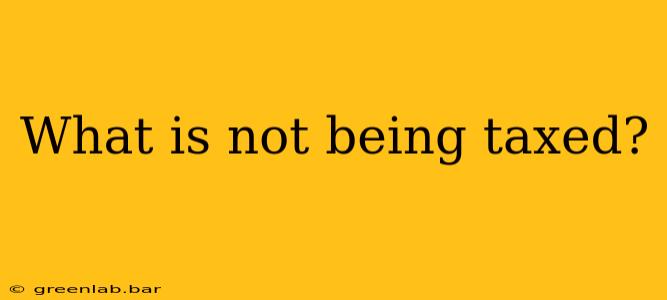What is Not Being Taxed? Uncovering the Loopholes and the Untaxed Sectors
The question "What is not being taxed?" is complex, varying significantly by country and even within specific jurisdictions. There's no single, simple answer, as tax systems are intricate and constantly evolving. However, we can explore some key areas where taxation is either limited, avoided, or outright absent, highlighting the inherent complexities and ethical considerations involved.
1. The Shadow Economy and Untaxed Transactions:
A significant portion of economic activity worldwide operates outside the formal tax system. This "shadow economy" encompasses various activities, including:
- Informal employment: Cash-based jobs like freelance work, gig economy tasks, and undocumented labor often escape tax scrutiny. This is a global issue impacting tax revenues significantly.
- Untracked transactions: Bartering, informal trades, and under-the-table payments evade taxation by design. The lack of digital records makes tracking and taxing these transactions extremely difficult.
- Black markets: Illegal activities, from drug trafficking to arms dealing, inherently operate outside legal and tax frameworks.
2. Tax Havens and Offshore Accounts:
Wealthy individuals and multinational corporations often utilize tax havens—countries with exceptionally low or no taxes—to minimize their tax burdens. This involves:
- Offshore accounts: Holding assets in countries with lax financial regulations and favorable tax laws allows for substantial tax avoidance.
- Transfer pricing: Manipulating the pricing of goods and services between subsidiaries in different countries to shift profits to lower-tax jurisdictions.
- Intricate financial structures: Utilizing complex corporate structures, trusts, and other legal entities to obscure the true ownership and profit flows, making it difficult for tax authorities to assess liability.
3. Specific Goods and Services:
Certain goods and services might receive preferential tax treatment or complete exemptions for various reasons, including:
- Exemptions for essential goods: Governments often exempt necessities like food or medicine from sales taxes to protect vulnerable populations.
- Subsidized sectors: Specific industries might receive tax breaks or incentives to encourage growth or support national interests. This can lead to an uneven playing field and potential inequities.
- Tax loopholes: Specific clauses or interpretations within tax laws can inadvertently create loopholes exploited by individuals and corporations to reduce their taxable income legally.
4. Digital Assets and the Crypto Industry:
The rapidly evolving digital asset landscape presents a significant challenge for tax authorities globally.
- Cryptocurrency transactions: The decentralized nature of cryptocurrencies and the lack of standardized reporting mechanisms make it difficult to track and tax transactions effectively.
- NFTs and other digital assets: The lack of clear regulatory frameworks surrounding non-fungible tokens (NFTs) and other digital assets creates ambiguities in their taxation.
5. Ethical and Societal Implications:
The existence of untaxed sectors raises significant ethical and societal concerns:
- Inequality: Tax avoidance disproportionately benefits the wealthy, exacerbating income inequality.
- Underfunded public services: Reduced tax revenues impact the funding of essential public services like healthcare, education, and infrastructure.
- Erosion of trust: Tax avoidance, whether legal or illegal, undermines public trust in government and the fairness of the tax system.
Conclusion:
Determining precisely "what is not being taxed" requires a deep understanding of specific national and international tax laws, coupled with an awareness of the ever-evolving nature of financial markets and economic activity. The issues discussed above represent key areas where significant tax avoidance and evasion occur, highlighting the need for greater transparency, stronger international cooperation, and more effective regulatory frameworks to ensure fairness and sustainable public finance. This is a constantly evolving field, and staying informed is crucial for both individuals and businesses.

